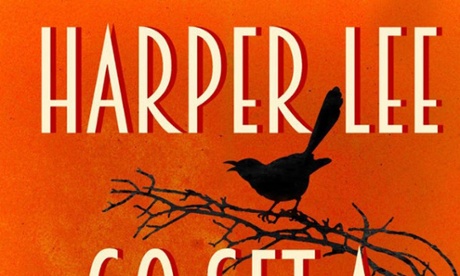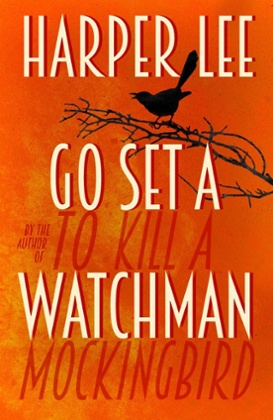
To Kill a Mockingbird is a book loved by all generations. It’s a timeless classic, so no wonder it’s studied in any school worth its salt. But despite TKAM’s worldwide renown, I’ve heard so little from the world of YA fiction on what they think of Lee’s new release.
Written before TKAM, Go Set a Watchman tells the story of an adult Scout returning to visit Maycomb from New York. Set in the backdrop of one of the most monumental changes in American society, as we see increasing civil rights tensions and an end to segregation, more divisions become apparent. This book exposes the prejudices between races, North versus South and the different generations.
As Scout adjusts to a fast-changing society, her perceptions of her neighbours, friends and family are altered forever. She must learn to adapt to her new discoveries and deal with her disillusions. Plus, with some cringe moments worthy of any coming-of-age YA novel, Go Set a Watchman is, quite simply, about growing up!

Truly, it is an amazing insight into American history, which raises issues that are still topical today. Some of the flashbacks had me in hysterics! Comparing society then to society now reminds me both of how much and how little we’ve changed.
With some harsh truths about the characters we know and love, it’s hard not to be disappointed by Go Set a Watchman. Sure, it doesn’t have the wit, punch or polish of TKAM, but to me it seems almost unfair to compare the two. Originally, Lee never intended to publish Go Set a Watchman and since it was written before TKAM, it’s ridiculous that some people are reading it as a sequel.
Atticus is an idol to millions, including myself, and just because in Go Set a Watchman he is no longer the same moral compass and, well, a bit of a racist, my opinion on his character in TKAM remains unchanged. The two versions of the character are so different that it’s impossible to view them as the same. Sure there’s many similarities between this book and TKAM, but instead of using it to build on our knowledge of the pre-existing characters, it should be read as an interesting insight into how Lee’s ideas for TKAM developed so as to produce one of the most remarkable modern classics of our time.
Now, it may seem a strange comparison, but if anything Go Set a Watchman reminds me of John Green’s Paper Towns. Here I’m just spitballing, but the deeper philosophy mingled with bits of comic relief works so well to create a read that’s both entertaining and topical. In their novels both Lee and Green show the loss of idealism in youth and their disillusionment as they grow up, warning about the dangers of idealising people to such an extent we turn them into gods.
Overall, acceptance is a key note in both books, but Go Set a Watchman manages to go further (after all we are talking about Harper Lee). As well as exploring how we grow up as individuals, Lee talks about the evolution of society.
Uncle Jack says: “Human birth is most unpleasant. It’s messy, it’s extremely painful, sometimes it’s a risky thing. It is always bloody. So is it with civilisation.”
This captures the era so brilliantly, as the political unrest and civil tensions brought out both the best and the worst in people. Lee uses Maycomb as a microcosm of American society and through Scout’s eyes we see the reactions of different communities and how policies made to bring people together began to drive them apart.
It’s strange that despite mainly being referred to as Jean Louise in the novel, I still call her Scout. Sure she’s not as much of a tomboy as in TKAM, but it was nice to see she’d remained true to her ideals, being a symbol for feminism and a refreshing contrast to the stereotype of Southern womanhood, as seen in Aunt Alexandra.
As a protagonist, she was brave and independent, yet her decision at the end left me questioning her moral strength. By accepting Maycomb the way it was, I felt Scout was giving up – she couldn’t beat the town, she couldn’t join it. But, then I started thinking about my own choices. My political opinions are so different from my parent’s views and my grandparent’s views that just watching the news can cause a fiery argument. For my grandparents, who have stuck by their beliefs for over 70 years, nothing I could say would ever change them.
It was a reminder not to be so bigoted and accept people, wrinkles and all. So in the end, Scout became more relatable because of her decisions, standing her ground for what she believes is right whilst choosing to see the good in people, rather than focus on their flaws.
Go Set a Watchman was by no means a perfect read, some passages were clunky and it doesn’t come close to reaching the literary heights of TKAM. But it’s left me thinking, abandoning my brain to spiral into debate about so many decisions made in the world today.
Too many people have been left disappointed to their own misimaginings of this book, but if you read it with an open mind (and try not to compare it too much to TKAM) I think you’ll be surprised. It was a wonderful story, filled with a range of ideologies and opinions that are great to sink your teeth into.
The more I look back on this book the more I enjoy it!
- Buy this book at the Guardian Bookshop
Want to tell the world about a book you’ve read? Join the site and send us your review!

